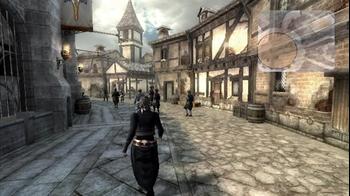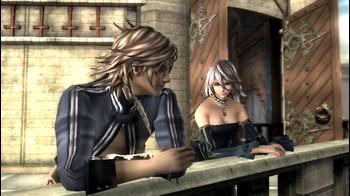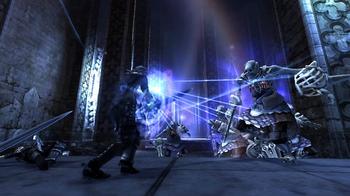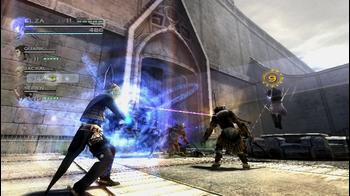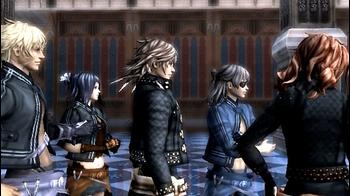
The Last Story Review
Hironobu Sakaguchi has perhaps done more to define the struggling Japanese RPG genre more than any other. His latest release, The Last Story, interlocks traditional genre tropes with new ideas in a move that underlines the genre's need to diversify - and makes a fairly good job of it.
The story won't be unfamiliar to fans of Sakaguchi's most famous child, Final Fantasy - you're cast in the role of Zael, a mercenary who is questing for coin and recognition with a group of friends. It's a coming of age story of sorts, with the young Zael searching as much for himself as he is adventure - it all feels very much traditional JRPG fare.
Zael and company obviously end up getting embroiled in events that are larger and more dangerous than your average mercenary job not long into the game. While the overarching story isn't one with the world-threatening gravity of some titles, the threat feels more interesting and dominating thanks to the manner in which the setting is characterised.
Lazulis Island features a single hustling, bustling city that reminds me in some ways of a more unique and interesting version of Lost Odyssey's Gohtza. Designed as an open-world like hub to the rest of the world, it's a place that you'll want to save - and the rest of The Last Story's locations are varied and pretty if sometimes a little uninteresting.
I hadn't expected to think too much of The Last Story's world coming off the back of Xenoblade, a game with a beautifully realized and lush world - but I found myself appreciating the craftsmanship of The Last Story's world as well as how much work had been done to make it feel like a believable, real place. It's a shame that it feels so by numbers, though.
The overall plot and world is perhaps weaker than it could've been, but like Lost Odyssey that's rescued by excellent characters. Zael's group of mercenaries work as a brilliant foil for the lead and the player, and while some of the dialogue can elicit a cringe with traditionally heavy-handed JRPG messaging the characters are enjoyably built.
Like Xenoblade, The Last Story features a British-produced localization, giving it a quirky flavour with most of the cast sporting a wide array of regional British dialects. There's a feel here in the voice work that reminds me a little of the Fable series' charm - not a bad thing.
The translation is generally well-handled and embraces that Britishness, pushing bits of British slang into the script to make the dialogue fit those accents better. The localization was clearly lovingly handled, and is less clear-cut of a translation than Xenoblade - and I think is better (but more cheesy) for it.
The story, world and plot of The Last Story aren't individually as strong as some of Mistwalker's recent efforts - especially the brilliantly-plotted Lost Odyssey - but come together and meld with a well-realized cast to work much better as an ensemble piece. Alone these elements are lacking, but together they make for a compelling narrative.
This all makes sense, though; as Sakaguchi has openly commented that with this game Mistwalker looked at gameplay first over story. Lost Odyssey's narrative was built first, the game systems fashioned around it - but in the case of The Last Story this process was reversed, gameplay coming first.
The big bullet point this time is Gathering, an ability that draws enemy attention to you and can be triggered in battle as much as you like. When activated, Gathering will mean the enemy AI focuses its attention on you, letting the rest of your party act unhindered.
The concept of Gathering is one heavily explored in MMOs, where a 'Tank' character would draw the ire of a mob of enemies to allow the rest of the players to attack in a more coordinated fashion. Here Zael is cast as tank via Gathering, and it's all about risking your ass to open up enemy weak points for the AI allies you have to get stuck in.
Zael has a number of health recovery options at his disposal, including health regeneration when you attack from early on, so if you're paying attention dying whilst using Gathering shouldn't be an issue.
The core of the system is of course real time - gathering wouldn't work as well in a turn based setting - and works with a semi-automatic battle system that only requires you move towards your target in order to get stuck into them with your melee weapon.
Real time elements are borrowed from other genres too, including a shooter-like cover system to hide from enemy sight or attacks, stealth elements where you can take down enemies quicker if you take them by surprise and even first-person aiming for longer-ranged attacks. Dodge and guard commands will also allow you to avoid or lessen the impact of enemy attacks.
As the game progresses Zael and his crew obtain a bunch of new abilities that run the gambit of genre tradition, including the Limit Break like Spirit Attack and a range of magic attacks. Individual battlefields offer unique scenarios, too, and may have destructible environments that can be used to damage enemies - bridges can be blasted out of existence and pillars can be blown apart with magic to bring the roof crashing in - it works well.
Magic is particularly interesting in The Last Story, with mages needing uninterrupted time to cast before the spell hits the battlefield. Gathering helps to distract enemies, and buffing, debuffing and going on the magical offensive all requires mages to be protected.
More control over the rest of your party can be exerted by hitting a more traditional 'Command Menu', and the variety of options on offer within any battle is often wide and varied. Another mode lets you drag the camera out to see a 'tactical' view of the battlefield that briefly makes the game resemble a full-blown strategy RPG.
In general these systems combine to mean that The Last Story can be treated as a much more tactical RPG than most. Almost every individual situation is approachable in a refreshing number of different ways that'll make battles a snap.
It's a little unfortunate that the combat, while exciting and fun, becomes too easy later on. The ally AI is smart enough to hold its own - a good thing - but also offering easy, free revivals through battles means it's hard to fail. I found myself still wanting to approach situations differently even though I could cruise most battles, though - I was just having a lot of fun doing so.
Past the excellent battle system there's the usual plethora of side quests and optional content to engage in. 'Seek Mode' allows you to locate hidden treasures, while there's a pleasing amount of character customization past the traditional progression of upgrading weapons and armour. Dyes can be used to adjust the colour of characters' clothing, and changes made there pleasingly carry through right into all the game's real-time cutscenes - meaning changes you make stay with you always.
The Last Story is more scant in side quest options than Xenoblade, choosing instead to focus on the core narrative more closely. Around a 20-hour experience, the game is tightly scripted and actually is served well by it. While shorter than some other JRPGs, the tighter nature of the experience means it doesn't outstay its welcome.
Online play has been added to offer a bit more value, offering six-player online multiplayer - a strange and alien thing to much of the genre. Deathmatch, Team Deathmatch and Co-Op play of major bosses are available. Online on the Wii isn't the most streamlined system, but The Last Story makes the best of a bad situation by working past this and presenting a solid adaption of its battle system into the online arena. Character customization also thankfully exists in the online modes, though isn't as extensive as it is in single player.
Visually the game looks great, but requires I add that horrible caveat text 'for a Wii game.' The Wii's age is starting to show now, and while The Last Story is one of the better-looking games for the machine, it's still not going to stand up to Mistwalker's Xbox 360 efforts.
Nobuo Uematsu's score has no such issue, though, and The Last Story sees him turn in another astonishingly brilliant soundtrack. It's not afraid to deviate somewhat from what would be expected from the man, but also holds many of the telltale signs of who was behind it. The score is the cherry on top; the final addition that makes The Last Story more than the sum of its parts.
Hironobu Sakaguchi has a great pedigree, and The Last Story is more than worthy of having his name attached to it. It's clear that he's still got it after all these years, and though there are flaws including a story that lacks in areas and some small presentational issues, the overall package is very attractive.
In a time when the genre that Final Fantasy helped to define in the West appears to be faltering it's reassuring to see that series' creator deliver an experience that's reassuringly familiar but also bravely and brilliantly different - and definitely worth your time.
